
Laser Squad is a turn-based tactics video game, originally released for the ZX Spectrum and later for the Commodore 64, Amstrad CPC, MSX, Amiga, Sharp MZ-800 and Atari ST and PC computers between 1988 and 1992. It was designed by Julian Gollop and his team at Target Games and published by Blade Software, expanding on the ideas applied in their earlier Rebelstar series. Laser Squad originally came with five mission scenarios, with an expansion pack released for the 8-bit versions, containing a further two scenarios.
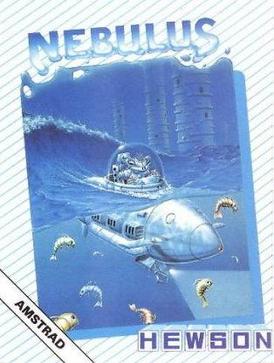
Nebulus is a platform game created by John M. Phillips and published by Hewson Consultants in the late 1980s for home computer systems. International releases and ports were known by various other names: Castelian, Kyorochan Land, Subline, and Tower Toppler.

Jet Set Willy II: The Final Frontier is a platform game released 1985 by Software Projects as the Amstrad CPC port of Jet Set Willy. It was then rebranded as the sequel and ported to other home computers. Jet Set Willy II was developed by Derrick P. Rowson and Steve Wetherill rather than Jet Set Willy programmer Matthew Smith and is an expansion of the original game, rather than an entirely new one.
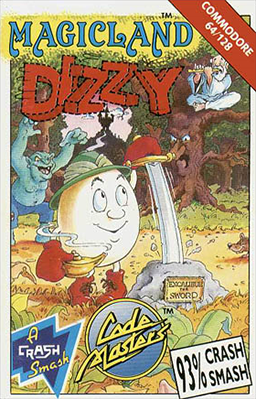
Magicland Dizzy is a platform adventure game published in Europe in 1990 by Codemasters for the ZX Spectrum, Commodore 64 and Amiga platforms. By 1992 there were also MS-DOS, Atari ST and Amstrad CPC versions available. It is the sixth game in the Dizzy series, and the fourth adventure-based Dizzy title. The story, set in a fantasy world called Magicland, follows on from the events of Fantasy World Dizzy, the previous adventure title. In Magicland Dizzy the player controls Dizzy, an egg-shaped character, who is trying to save six of his friends who have been placed under spells by the Evil Wizard Zaks.
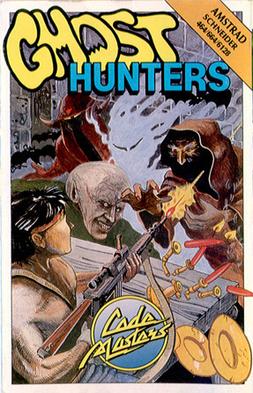
Ghost Hunters is a platform game written by the Oliver twins for the Amstrad CPC and published by Codemasters in January 1987. It was also converted and released for the ZX Spectrum (1987) and Commodore 64 (1989) platforms. The game combines platform-style action with shooting gameplay similar to that found in the game Operation Wolf. It was conceived as a sequel to Super Robin Hood, although it has little to do with this game other than using a modified version of its engine. The twins have credited the film Ghostbusters and the cartoon series Scooby-Doo for influencing the game.

Exolon is a run and gun game programmed by Raffaele Cecco and published by Hewson in 1987 for the ZX Spectrum, Commodore 64, and Amstrad CPC. It was later converted to the Enterprise 128, Amiga, and Atari ST.
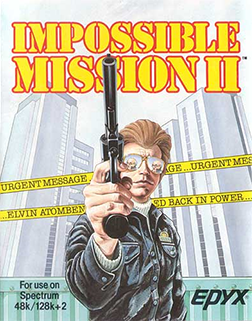
Impossible Mission II is a video game developed by Novotrade and published by Epyx in 1988. It was released for the Commodore 64, ZX Spectrum, Amstrad CPC, Enterprise 128, Nintendo Entertainment System, DOS, Atari ST, Apple II with at least 128K, Apple IIGS, and Amiga.
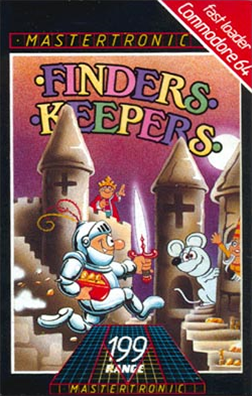
Finders Keepers is a video game written by David Jones and the first game in the Magic Knight series. It was published on the Mastertronic label for the ZX Spectrum, Amstrad CPC, MSX, Commodore 64, and Commodore 16 in 1985. Published in the United Kingdom at the budget price of £1.99. Finders Keepers is a platform game with some maze sections.

Technician Ted is a platform game for the Amstrad CPC and ZX Spectrum home computers that was written by Steve Marsden and David Cooke and published in 1984 by Hewson Consultants.
Sir Lancelot is a platform game published in 1984 by Melbourne House for the Amstrad CPC and ZX Spectrum home computers.
Mikro-Gen was a UK software company based in Bracknell, Berkshire that produced games for home computers in the early to mid-1980s.
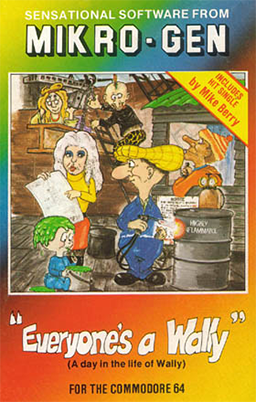
Everyone's a Wally is a British video game released in 1985 by Mikro-Gen for the ZX Spectrum, Amstrad CPC, and Commodore 64. The sequel to Pyjamarama, it features the same hero character, Wally Week, and uses an upgraded version of the same game engine.
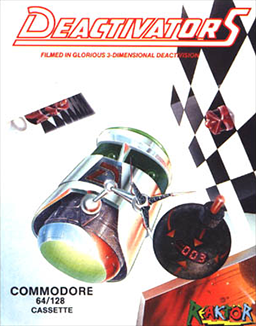
Deactivators is a 1986 puzzle video game designed by David Bishop and Chris Palmer, developed by Tigress Marketing and System Software, and published by Ariolasoft's action game imprint Reaktor. The player controls bomb disposal robots known as deactivators and must use them to deactivate bombs planted by terrorists in five research complexes. The concept for the game came from a brainstorming session between Bishop and Palmer; its design and development took five to six months to complete. It was released for the Amstrad CPC 464, Commodore 64, and ZX Spectrum platforms in October 1986.

Rambo is a 1985 video game based on the film Rambo: First Blood Part II (1985). The game was designed by David Collier and Tony Pomfret with the ZX Spectrum version converted by Platinum Productions.

Three Weeks in Paradise is a video game released in 1986 by Mikro-Gen for the ZX Spectrum and Amstrad CPC platforms. It is the last action-adventure platform in the Wally Week series.

Jack the Nipper is a video game by Gremlin Graphics released in 1986 for ZX Spectrum, Commodore 64, Amstrad CPC, and MSX. It was followed by a sequel, Jack the Nipper II: In Coconut Capers.

Light Force is a 1986 vertically scrolling shooter designed by Greg Follis and Roy Carter, developed by their company Gargoyle Games, and published under their Faster Than Light imprint. It was released for the Amstrad CPC, Commodore 64, and ZX Spectrum platforms.
Quattro is a series of video game compilations released in the 1990s. They consisted of games developed by Codemasters. The NES versions were released as multicarts and were published by Camerica without a license by Nintendo.

Storm Warrior is a 1989 beat 'em up video game developed and released by Elite Systems for the Amstrad CPC and Commodore 64 8-bit home computer systems. The game casts the player in the role of a prince on a quest to rid his kingdom of a witch's curse. It is unrelated to the 1984 game Storm Warrior.

Judge Dredd is a 1991 platform shoot 'em up video game based on the character of the same name. It was developed by Random Access and published by Virgin Mastertronic. It was released in Europe in 1991, for the Amiga, Atari ST, Commodore 64, and ZX Spectrum. Critics found the gameplay repetitive.



















